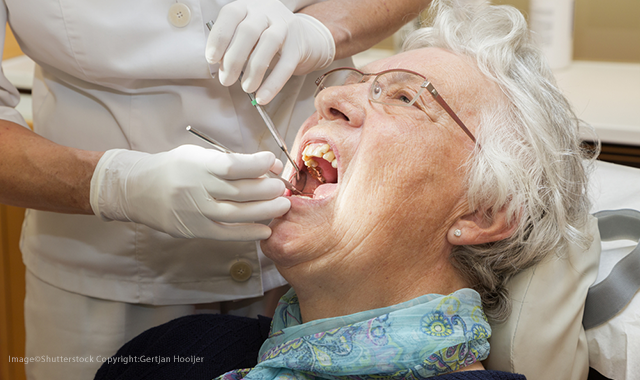Are elderly patients with caries at risk of developing respiratory problems?
New research takes a look at the link between poor dental hygiene and breathing issues.

As the demographic of older adults continues to grow, geriatric dentistry is becoming a focus of many dental offices. Elderly dental patients present their own unique set of challenges. Physical or cognitive impairments can make home dental care difficult, while prescription medications can lead to adverse reactions. Many older adults also lack dental insurance, which can present an obstacle to obtaining needed dental care.
In addition, older adults are susceptible to tooth decay. According to a 1999-2004 National Health and Nutrition Examination Survey, approximately 18 percent of adults ages 65 and older with retained natural teeth have untreated caries. Moreover, a 2009-2012 study found that 68 percent of those patients have periodontitis.
Caries in elderly individuals may present a major problem, as new research suggests that older adults with caries and fewer teeth may develop respiratory problems.
Trending article: 7 MORE of the scariest medical conditions with links to oral health
Researchers in Japan set out to investigate the variation in tongue microbiota among community-dwelling elderly adults. According to ScienceDaily, previous research has determined that constant aspiration of saliva can lead to pneumonia, which is a major cause of death among older adults with swallowing impairments. In addition, studies have shown that tongue microbiota are a dominant source of oral microbial populations that are ingested with saliva, and that the dysbiotic shift of indigenous tongue microbiota is associated with an increased risk of death from pneumonia in frail elderly adults.

The researchers in Japan collected tongue coatings from a 15-mm-diameter area at the center of the tongue of 506 elderly adults ages 70-80 who inhabit the town of Hisayama, Japan. The microbial composition of the samples was determined using a gene sequencing approach and quantitative PCR analysis.
The researchers discovered that the microbiota composition showed an association with tooth conditions. In addition, co-occurrence network analysis identified two cohabiting groups of predominant commensals, including one primarily composed of organisms that have been previously associated with an increased risk of mortality due to pneumonia in the frail elderly.
“The bacterial group was more predominant in the elderly with fewer teeth, a higher plaque index and more dental caries experience, whereas the total bacterial density was independent of these traits,” the study states. “A higher density of fungi was also observed in the elderly with these traits as well as in individuals who wore dentures. These results suggest that elderly adults with poorer oral health swallow a more dysbiotic microbiota formed on the tongue.”
The researchers concluded that careful attention should be given to the tongue microbiota status of elderly adults who exhibit poor dental conditions.
More from the author: The states with the best and worst oral health in 2018
This isn’t the first time research has discovered a connection between oral health and respiratory problems. In 2016, Chinese researchers found that individuals with gum disease have a 1.24-fold increased risk of developing lung cancer. In addition, the research indicated that women with periodontal disease are more likely than males to develop lung cancer.
MouthHealthy, part of the American Dental Association, notes that a common cause of caries in older adults is dry mouth. To relieve dry mouth symptoms and prevent cavities, the organization recommends using over-the-counter oral moisturizers, drinking more water, using sugar-free gum or lozenges to stimulate saliva production, and avoiding foods and beverages that irritate dry mouths such as coffee, alcohol and carbonated drinks. In addition, spouses or family members should make sure elderly relatives are brushing twice a day and flossing daily as well as visiting the dentist regularly.
The full study, titled "Tongue Microbiota and Oral Health Status in Community-Dwelling Elderly Adults," appeared in mSphere, an open access journal published by the American Society for Microbiology.